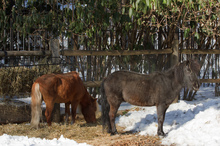According to a survey by SmartPak, 7 out of 10 horses aren’t getting a full serving of fortified grain or complete feed.

Better nutrition - Better horse health
According to a survey by SmartPak, 7 out of 10 horses aren’t getting a full serving of fortified grain or complete feed.
Why not? Unfortunately, there isn’t one simple answer. Luckily, we can help! In this article, we’ll review some of the most common reasons horses’ diets are lacking, and we’ll help you figure out how to make sure your horse has everything he needs to be his best.
Focus on forage, the foundation of your horse’s diet
Smart riders know that forage (hay and pasture) should be the foundation of a horse’s diet. Horses were designed to graze for up to 20 hours per day, but that much fresh, quality pasture is hard to come by for many horse owners, so we turn to hay.
The general rule of thumb is that horses should be eating about 1–2% of their body weight in forage every day (for the average 1,000lb horse, that’s 10–20lbs daily!). While access to plenty of roughage is critical for healthy digestion and general well-being, even great quality hay starts losing its nutrients as soon as it’s cut.
That means that while hay is an important part of your horse’s diet, by the time it’s dried, stored, delivered, and fed, it may have lost many key vitamins and minerals.
The scoop on grain
Be smart about what you’re serving up. Grain is not a feed source horses were built to digest. Instead of the steady intake of complex carbohydrates (fiber) that comes from grazing on forages, infrequent grain meals provide a concentrated source of calories and create a “feasting and fasting” cycle that can disrupt healthy digestion.
However, this doesn’t mean that all grains are “evil.” For hard keepers and athletes in hard work, a full serving of calorie-dense grain may be an essential part of the diet. For most horses, however, less is more.
Feeding the minimum amount of grain required to support healthy body condition, in small meals throughout the day, is the best way to ensure normal digestion and a healthy weight. That said, these partial grain servings create a problem of their own.
What’s in a “Scoop”?
Most commercial grains are fortified with vitamins and minerals to help meet your horse’s daily nutritional requirements. However, in order to receive enough nutrients from his grain, your horse must receive the full, manufacturer-recommended serving size for his age, weight, and workload.
Herein lies a common conundrum—most horses simply don’t need that many calories, and over-feeding grain can lead to unwanted energy, digestive upset, and obesity. But with a partial serving of fortified grain comes a partial serving of key nutrients, meaning your horse may not be getting adequate levels of the vitamins he needs to truly thrive and perform his best.
Get to know your grains
There are many types of “grains,” but do you know what makes them different?
Complete Feed:
A manufactured feed that combines grain and roughage; designed to partially or completely replace a horse’s forage, usually due to dental problems, or because quality hay is not available. Examples: Purina Equine Senior, Nutrena Triumph Complete Horse Feed.
Serving size: 15–20 lbs.
Fortified Grain
A manufactured feed that includes added, guaranteed levels of protein, vitamins, and minerals; common types include pelleted and sweet feeds.
Examples: Purina Omolene #100®, Triple Crown 14% Performance®, Nutrena Safe Choice Original®.
Serving size: 5 - 9 lbs
Whole Grain
A cereal grain that has not been fortified with additional nutrients; may be processed by cracking, crimping, rolling, or heating.
Examples: oats, corn, barley.
Serving size: 1–5 lbs
Ration Balancer
A concentrated feedstuff (usually a pellet) designed to balance a forage-only diet by providing protein, vitamins, and minerals; not a significant source of calories; ideal for easy keepers.
Examples: Purina Nature’s Essentials® Enrich 32®, Nutrena Empower™ Balance.
Serving size: 1–21/2 lbs
